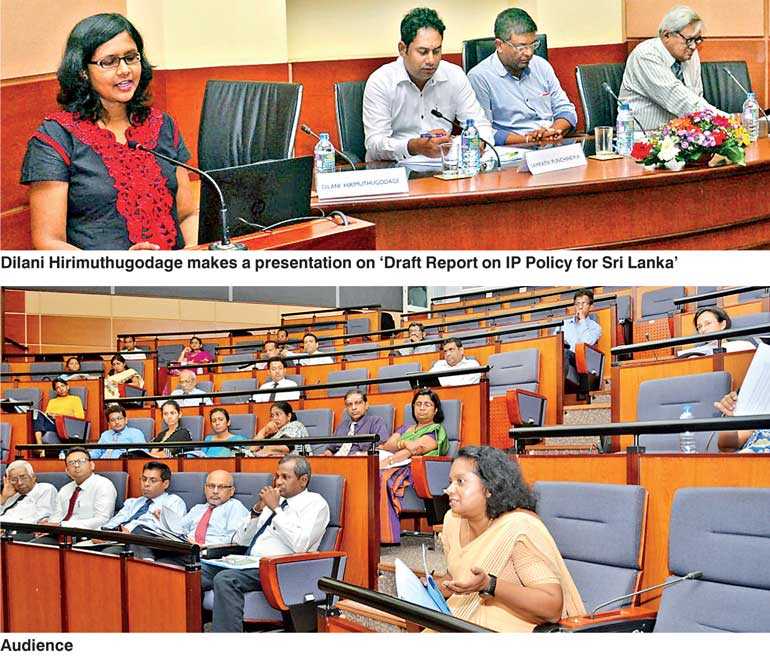Monday Feb 23, 2026
Monday Feb 23, 2026
Monday, 18 June 2018 00:00 - - {{hitsCtrl.values.hits}}

From left: Institute of Policy Studies of Sri Lanka Executive Director Dr. Dushni Weerakoon, Ministry of Industry and Commerce Additional Secretary M.A. Thajudeen, University of Colombo Faculty of Law Senior Lecturer Dr. Sampath Punchihewa, COSTI Project Director and IP Policy Formulation Sub-Committee Co-Chairman Prof. Ajith De Alwis, Institute of Policy Studies of Sri Lanka Research Officer Dilani Hirimuthugodage
Protection for Intellectual Property (IP) is vital to support growth and stimulate innovation in developing countries, provided that they are implemented at the right time – and Sri Lanka is at the right stage in development to formulate and implement such a policy, highlighted Institute of Policy Studies of Sri Lanka (IPS) Executive Director Dushni Weerakoon.
Dr. Weerakoon also noted that a strong IP policy was especially important as Sri Lanka is transitioning to a highly-competitive, knowledge-based economy, fuelled by free trade.
She made these remarks at the Validation Workshop on ‘Formulation of Intellectual Property Policy for Sri Lanka’, organised by IPS, in collaboration with the Ministry of Industry and Commerce (MIC) on 11 June, at the Dr. Saman Kelegama Auditorium in Colombo.
IPS and the Ministry commenced formulating an IP policy for Sri Lanka in February this year. The research related to this process is carried out by IPS Research Officer Dilani Hirimuthugodage, with Senior Lecturer of the Faculty of Law at University of Colombo, Sampath Punchihewa and IPS former Research Fellow Parakrama Samaratunga, supported by the members of the IP Policy formulation sub-committee.
Hirimuthugodage highlighted 11 policy statements to address existing gaps, policy implementation strategies, and institutes responsible for implementing such strategies. In her presentation, she strongly emphasised the need for creating awareness among general public and encouraged he generation and creation of intellectual property rights.
Meanwhile, Dr. Punchihewa elaborated on the importance of having an IP policy in par with the international standards.
Chairing the technical session, IP Policy Formulation Sub-Committee Co-Chairman Prof. Ajith de Alwis stressed the need to promote innovation mindsets throughout the primary, secondary, and tertiary education systems and the importance of commercialisation of intellectual properties in universities and research institutes.
The validation workshop aimed to disseminate the draft report on IP Policy for Sri Lanka, to facilitate a dialogue between key stakeholders on policy implementation strategies, and to finalise the policy statements, implementation strategies, and policy goals.
